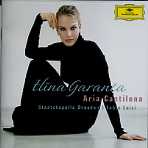This is a difficult CD to review. Elina Garanča is a remarkable singer, with a well-trained voice that is comfortable through its entire range; she can handle coloratura with ease and lean on the voice enough to make a grand, dramatic sound. But there isn’t one aria in this interesting, varied program that she actually makes her own; each one reminded me of how much I prefer another singer or two in the part.
The perky “Carceleras” by the Zarzuela composer Ruperto Chapi has the requisite charm and is as lusty as it is impertinent, but the voices of Teresa Berganza and Conchita Supervia kept popping into my head, not to mention Montserrat Caballé (who often sang it as an encore). Charlotte’s “Letter Scene” from Werther is sung with intensity and intelligence, and Garanča scales back her tone, but it lacks the sadness and gravitas I recall from Régine Crespin, to name just one. Niclausse’s “Violin” aria shows off Garanča’s ravishing legato–invariably in evidence here–but she misses the ecstatic buildup to the word “l’amour”, which is the whole point of this brief aria. Both Cenerentola’s final rondo and Isabella’s “Per lui che adoro” from L’italiana in Algeri are delightful, with nice, refreshing embellishments, but Garanča has none of the contralto sound that makes these arias–nor is there a trill. (Where’s Horne? Berganza? Supervia?)
The ditty from La Grande-Duchesse de Gérolstein is not nearly as wacky as we might like–just listen to Stade or, again, Crespin. The Bachianas brasileiras no. 5 (in an orchestral arrangement) is beautifully sung, and I won’t even mention Bidu Sayao. Montsalvatge’s “Madrigal…” is a lovely piece, and once again shows Garanča’s legato to be smooth as silk. The concluding trio and duet from Der Rosenkavalier, with Diana Damrau as Sophie and Adrianne Pieczonka as the Marshallin, is handsome and dreamy–all three women shine.
The entire production is first class, with chorus and soloists added to the numbers that require them, and Fabio Luisi leads the world-class Dresden forces with style. I realize that comparisons are odious and I, like most reviewers, try to avoid them, but what can I do? Garanča, on this hour-long recital, does almost nothing wrong (there is the occasional pitch problem in the Chapi and right at the start of the trio) and seems to have everything but an individual profile. The recital gives pleasure but I remained unmoved by most of it. Correct me if I’m wrong.
































